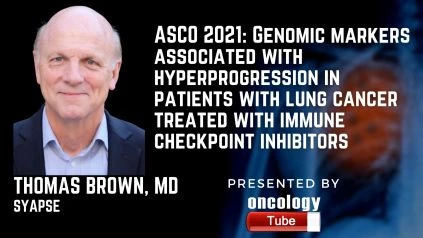Thomas Brown, MD, Chief Medical Officer, Syapse speaks about ASCO 2021 Poster – #9105 – Genomic markers associated with hyperprogression in patients with lung cancer treated with immune checkpoint inhibitors.
Link to Poster:
https://meetinglibrary.asco.org/record/200547/abstract
Background:
Immune checkpoint inhibitor (ICI) therapy has become a standard of care for patients with non-small cell lung cancer (NSCLC). However, not all patients (pts) benefit with ICI, with a percentage reporting increased tumor development. Hyperprogression (HP) is a term used to describe faster tumor development on ICI along with the deteriorating clinical state. MDM2/MDM4 amplifications, EGFR alterations, and STK11/LKB1 mutations are some of the gene changes that have been linked to HP. HP was seen in 6/6 pts with MDM2/MDM4 amplification and 2/10 pts with EGFR changes, according to Kato et al. (doi: 10.1158/1078-0432.CCR-16-3133). HP in patients with NSCLC treated with ICIs in a big health system is described in this article.
Methods:
After IRB permission, patients with NSCLC treated with ICIs at Advocate Aurora Health from January 2012 to January 2021 were examined. The real-world data integrated into the Syapse Learning Health Network platform was used to identify patients with NSCLC histology (ICD diagnostic codes and/or manual chart review), ICI therapy, and molecular testing. A second chart review was conducted to determine HP, and molecular data were evaluated. 1) time-to-treatment failure 2 months (from start to stop of ICI for any reason), 2) RECIST > 50% increase in tumor burden, 3) disease spread to a new organ between baseline and first radiologic evaluation or clinical deterioration, and 4) ECOG PS 2 during the first 2 months of treatment are all HP criteria. HP = > 3, progression = 1-2, and non-progressor = 0 based on the number of conditions met. The Chi-squared and Fisher Exact tests were used to compare points with and without HP. For continuous variables, T-tests were used.
Results:
A total of 1,389 NSCLC patients were treated with ICIs, including atezolizumab (40 patients, 3%), durvalumab (17 patients, 1%), nivolumab (167 patients, 12%), pembrolizumab (190 patients, 14%), and multiple ICIs (12 pts, 1 percent ). Molecular testing was conducted on 427 of the pts who were given ICIs (31 percent ). 98 of the 427 participants (23%) had HP, whereas another 86 (20%) had progressing illness but did not fit the diagnosis of HP. The table below shows the biomarker connections with HP. HP was found in patients with the following tumor gene mutations: EGFR (20/60), STK11/LKB1 (16/25), and MDM2/4 (4/7).
Conclusions:
EGFR, STK11/LKB1, and MDM2/4 gene mutations were all shown to be statistically significant in HP. In order to optimize the selection of patients for ICI treatment, clinical and genetic predictors of HP must be investigated.

